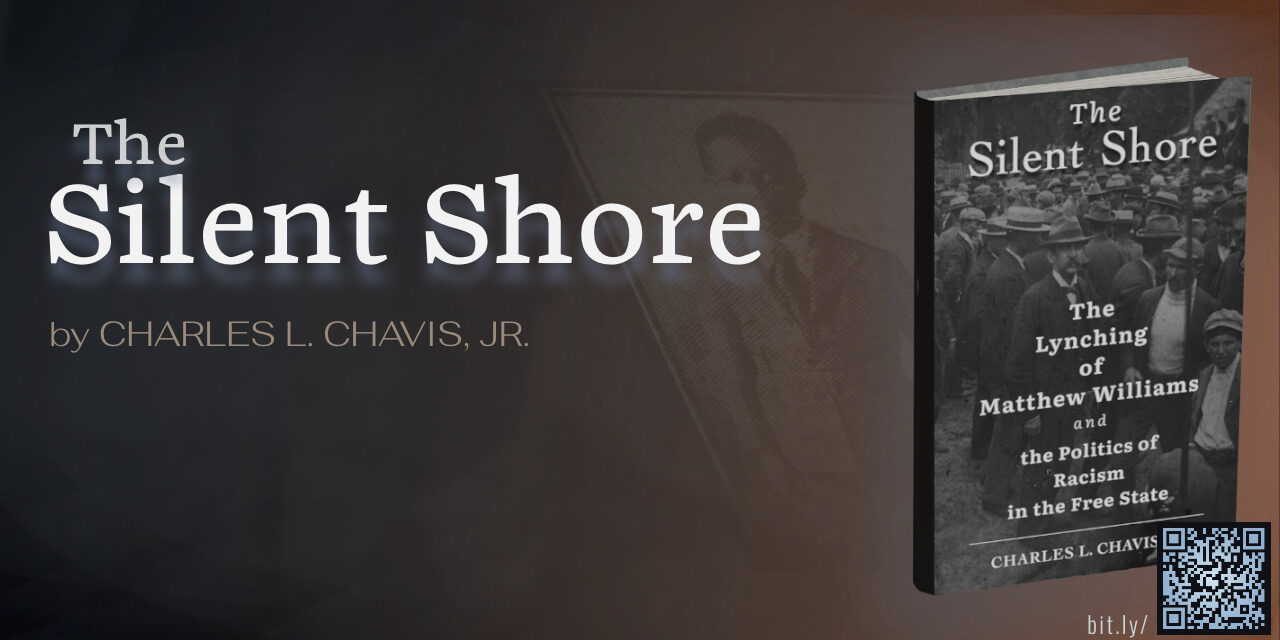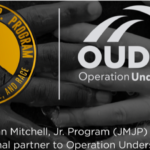New Book and Film by Mason Professor Reveals State Cover-Up and the Hidden History of a Maryland Lynching
FOR IMMEDIATE RELEASE
Media Contact: Phylicia M. Powers (pmp.thesilentshorebook@gmail.com)
Mitchell Program Contact: Jack Del Nunzio (jmjp@gmu.edu)
→ Purchase Book: The Silent Shore
→ Watch Companion Film: Hidden in Full View
January 17th, 2022 | Arlington, VA — Dr. Charles L. Chavis, Jr., Director of African and African American Studies and Director of the John Mitchell, Jr. Program for History, Justice, and Race at the Jimmy and Rosalynn Carter School for Peace and Conflict Resolution (Carter) at George Mason University has released his long-awaited book The Silent Shore: The Lynching of Matthew Williams and the Politics of Racism in the Free State with Johns Hopkins University Press.
Professor Chavis has invested five years probing the lynching of a young Black man in Salisbury on Maryland’s Eastern Shore 90 years ago; what 23-year-old Matthew Williams meant to his family and community, the leaders of the supposedly spontaneous mob, and how the white power structure covered up the crime. The author draws on his discovery of previously unreleased investigative documents which had been “sealed” without explanation at the government archive for nearly a century. Combining these sources with descendant and eyewitness interviews, Chavis meticulously reconstructs the full story of one of the last lynchings in Maryland.
Chavis further synthesizes what these events mean today: the lingering effect of Williams’s death on the Black community in Salisbury, the broader Eastern Shore, and the state of Maryland, as well as its imprint on the politics of American racism and the legacy of “modern-day lynchings.”
The Silent Shore is now available at https://jhupbooks.press.jhu.edu/title/silent-shore
In addition, the story of this cover-up and its near-accidental uncovering by Dr. Chavis is the basis for a new short film, Hidden in Full View—the first in a series of documentary shorts that will uncover lesser-known episodes of racial terror in Black communities throughout the United States. Trailers and on-demand screenings of the film are available at hiddeninfullviewseries.com
Praise for The Silent Shore comes from national Civil Rights leaders, thought leaders, and descendants of Matthew Williams:
“The Silent Shore is a must-read account of the 1931 lynching of a young Black man on a December evening in downtown Salisbury, Maryland. The event was a seminal one: an act of racial terrorism which, along with other lynchings on the Eastern Shore of Maryland, shaped the dynamics of race and power across the state for decades to come. Chavis digs deep, finding documents never before seen publicly, to present a rich and revealing story of how lynchings were planned and executed, and of the conspiracy of silence among white people in the region that shrouded the perpetrators of lynching from accountability. The story resonates with power and caution for our contemporary efforts to address racial violence and discrimination.”
— Sherrilyn Ifill, President/Director-Counsel, NAACP Legal Defense and Educational Fund, author of On The Courthouse Lawn: Confronting the Legacy of Lynching in the Twenty-First Century
“The Silent Shore is excellent and essential reading. By recovering the tragic story of Matthew Williams, Charles L. Chavis, Jr. enriches the history of lynching in America. Deeply researched and brimming with important insights, this book locates the ‘free state’ of Maryland as a critical site of contestation over race, democracy, and citizenship in ways that continue to reverberate in the age of Black Lives Matter.”
— Dr. Peniel E. Joseph, The University of Texas at Austin, author of The Sword and the Shield: The Revolutionary Lives of Malcolm X and Martin Luther King Jr.
“The detailed day-by-day and point-by-point account of the horrific lynching of Matthew Williams is rare, but as the revealed truth, it is necessary—no matter how painful it is to me or the descendants of other individuals involved. Dr. Chavis has done us all a great service, but what is of particular importance is how this case is handled from this point forward and how it will set a precedent for the way other similar cases—the more than 6,000 recorded lynchings in the United States—are researched, investigated, and addressed by the justice system.”
— Ms. Tracey “Jeannie” Jones, Descendent of Matthew Williams





